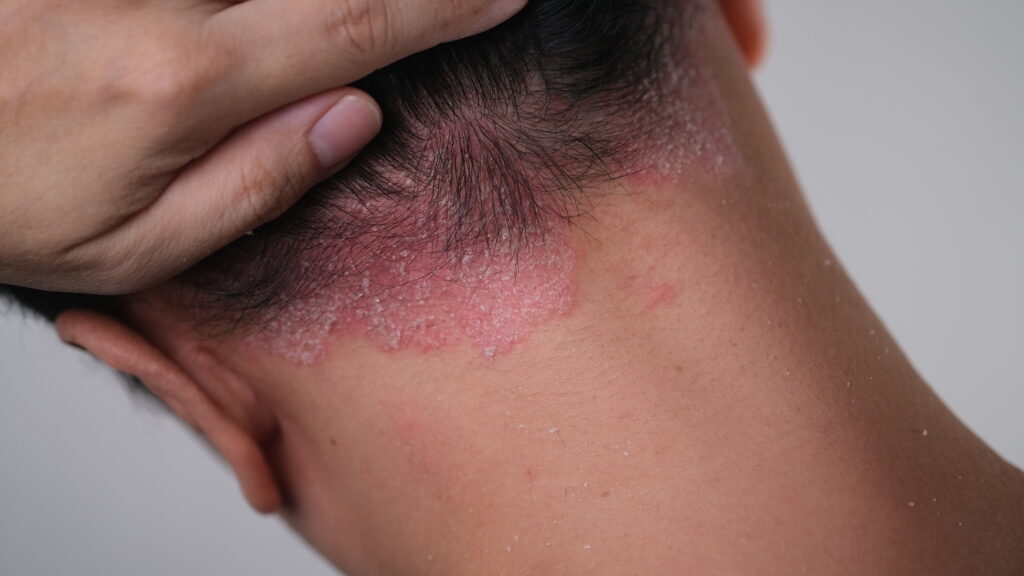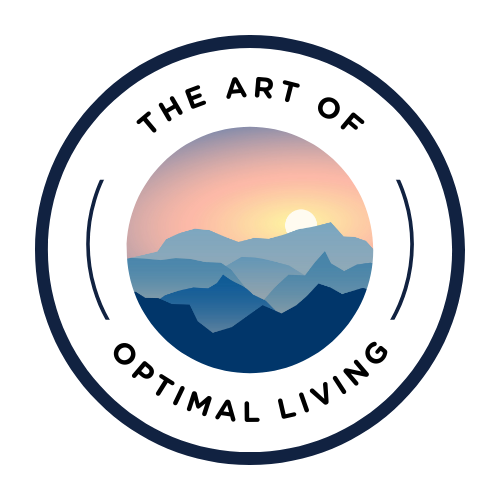How to Get Rid of Psoriasis - Naturally
My Experience
I’ve been dealing with Psoriasis since I was 12 years old. I remember the first symptoms I had were the big chunks of caked up dandruff on my scalp. What followed that was red scaly rashes all over my torso. It was disgusting, and my mom and I were horrified. They treated me with topical steroids and methotrexate (for my arthritis as well) and my symptoms seemed to dissipate. I continued to use these drugs, along with Enbrel and eventually Humira for years into my 20s. I would occasionally have a flare on my scalp or under my armpits (or even on my face under my eyes). Until recently, I had no idea that Psoriasis doesn’t come from inflammed or poor skin, but is a result of an overactive immune sytem. What appears to be an skin condition, starts on the inside of your body. Once you realize that, treatment becomes very different.

What is Psoriasis
Psoriasis is an autoimmune disease, characterized by inflammation caused by dysfunction of the immune system. When you have an autoimmune disease, your immune system basically kicks into overdrive and mistakenly attacks itself. This can happen for several reason. But simply put, it is confused. In the case of Psoriasis, your immune system attacks the skin. Normally our skin cells grow and shed in about a month, with Psoriasis this process happens in just a few days. It doesn’t have time to shed, so it piles up on the skin.
A big problem with Psoriasis is that it can impact other organs when not under control. For example the joints when one develops psoriatic arthritis. The scary thing about autoimmune diseases are that once you have one you are much more likely to develop another. I think this is because they all stem from the same problem… About 25% of patients with an autoimmune diseases have a tendency to develop additional autoimmune disease. So it’s important to do your best at calming your immune system down so you don’t develop any more condition
How to effectively get rid of it
Since psoriasis stems from immune dysfunction, the most effective way to calm it down is by healing the immune system. To do that we are going to focus on healing the gut by removing inflammatory and damaging foods. Since about 70% of your immune system is within your digestive track, what you put in your mouth has a huge impact on immune function. Below is a list of the most common dietary triggers for Psoriasis.
Now I do think topical steroids can be helpful to assist calming a really bad flare. However, if you want to avoid having to rely on those forever or just don’t want that stuff on your skin (that’s me) then it is really important to stick to the guidelines below.
It’s important to know that everyone reacts differently to different things. Just because something works for me doesn’t mean it will for you, so you must experiment. Now this will take some work and time, but trust me it’s worth it. Here is what I and many others have done to successfully reduce Psoriasis flares and inflammation in general. I recommend cutting all of these out for at least 3 months, then slowly adding them back in one by one if you’d like. For more information on how to properly do an Elimination Diet for autoimmune disease, read my post on the subject. Of course I am not a medical doctor. I encourage you to consult a PCP with this information and get feedback. If you doctor shoots these ideas down and insists you use steroid creams forever, it may be time to find a new doctor.
Tobacco (all forms)
There is a lot of evidence showing a relationship between smoking and psoriasis risk and severity. Smoking has been linked to an increased risk of developing Psoriasis. Even 2nd hand smoking has been shown to increase risk. Not only does smoking increase risk of developing Psoriasis but it also increases severity of symptoms. In a 2016 study, PASI (Psoriasis area and severity index) was found to be higher in smokers. Not only does smoking increase disease severity, but chewing tobacco does too. Tobacco is a nightshade which can cause damage to your gut microbiome and increase systemic inflammation. If you smoke and are looking for another reason to quit (there should be plenty of others), you can add psoriasis to the list.
Alcohol
Alcohol consumption causes inflammation in the gut (which you now know holds the majority of the immune system). It has shown to be linked with Psoriasis severity. Beer and wine in particular should be avoided, due to the gluten and high sugar content. But so should hard liquors and seltzers. I’ll admit I have been Psoriasis free for months at a time while drinking alcohol (hard liquor or seltzers only) one or twice per week. I’d recommend cutting back to essentially zero drinks during the elinination phase until your Psoriasis is under control, then slowly beginning to add it back in (I aim for no more than 2-5 drinks/week). Again, being strict in the elimination phase is important to recover quickly and eliminate variables. Then it is okay to slowly add things back in one at a time.
Gluten (and all grains)
Gluten is the main protein in wheat, which has been shown to negatively impact the gut microbiome. A gluten free diet has been taught by many to be a great diet intervention to reduce symptoms of autoimmune disease. But does it actually work? Research shows that people with psoriasis tend to have higher rates of celiac disease. A study done in 2017 found that a gluten free diet reduced symptoms in patients with Psoriasis that were positive for celiac related antibodies. The gluten free diet was not successful in reducing symptoms of patients with psoriasis that were negative for the celiac related antibodies. However, only 6 patients were in this arm of the study.
I’ve seen strong evidence for removing gluten as a means to improving symptoms of autoimmune disease. Personally, a gluten free diet has helped me in the past 2 years reduce my symptoms and the need for medication. I highly recommend removing gluten (as well as all other grains) during the elimination phase.
Dairy
Research is still lacking in the effectiveness of dairy removal for Psoriasis treatment. The idea with diary is that it also negatively impacts the gut barrier. Humans aren’t designed to digest dairy past infancy. That is why so many people develop lactose intolerance. Anecdotally I can say that removing dairy has helped myself and many others with Psoriasis. Following the elimination approach I would remove dairy for 3 months, then slowly add it back in to see if you can tolerate it.
Nut and Seeds
Many nuts and seeds have proven to provide many health benefits (to a certain extent). However, nuts and seeds contain a high amount of phytates that are unavailable to be broken down and absorbed by the gut, which causes damage. Further more, research has shown that you may have a higher chance of a food intolerance if you have an autoimmune disease. It’s best to avoid all nuts and seeds during the elimination phase. Since they are such nutrient dense foods, you should prioritize reintroduction into you diet when you are done with the elimination phase.
Vegetable and Seed Oils
Every day there seems to be more information on the harmful effects that vegetables and seed oils have on our health. One of these effects may be psoriasis and autoimmune flares. A 2024 study published in Frontiers in Nutrition showed that both omega-6 PUFA and MUFA (polyunsaturated and monounsaturated fatty acids) cause psoriasis. These omega-6 PUFAs and MUFAs come from vegetable and seeds oils. The study showed that lowering these fats was an effective treatment.
Nightshades
Nightshades are part of the Solanaceae plant family and include tomatoes, potatoes, eggplant, tobacco and peppers. Nightshades disturb the intestinal lining of the gut and have been shown to affect digestion in humans and animals. Removing nightshades has been helpful in reducing psoriasis severity in many people.
Stress
A few months back I had a very stressful accident with a close family member. One of the scariest few hours of my life. Afterwards I had one of the worst psoriasis flares on my scalp I’ve ever seen. Since then I have worked on relaxation and stress reduction techniques. My symptoms since have dramatically improved.
Stress can cause psoriasis flares, but a psoriasis flare can also cause stress. It’s important to learn how to manage the stress in your life. You also need to realize that psoriasis is nothing to be embarrassed about. Sure it can look bad, but the disease isn’t your fault and you certainty aren’t a worse person for it. I encourage you to share your story with others. I tell many people about my Psoriasis and what I’ve done to control it. I think when people hear stories like this, they get inspired to make positive changs in their lives. Inspiring change in other peope has been one of the most rewarding parts of the process!
Supplements and Nutritional Advice
Here is a list of supplements I recommend taking to relieve Psoriasis symptoms and boost overall health.
- Fish oil (DHA and EPA) has been shown to cause a moderate reduction in psoriasis symptoms. Fish oil has many other benefits, so I highly recommend supplementing.
- Vitamin D3 and k2 (get vitamin d level check, it’s cheap and very important)
- Turmeric
- Probiotics – rebalancing the gut microbiome is important for strengthening the immune system and decreasing inflammation. A well rounded probiotic can help kickstart this process.
- Add plenty of fresh produce, fruits and vegetables, which strengthen the gut and decrease inflammation. (Not a supplement, but very important for autoimmune disease

1 thought on “How to Get Rid of Psoriasis – Naturally”
Pingback: Elimination Diet: An End to Autoimmune Suffering – Art of Optimal Living